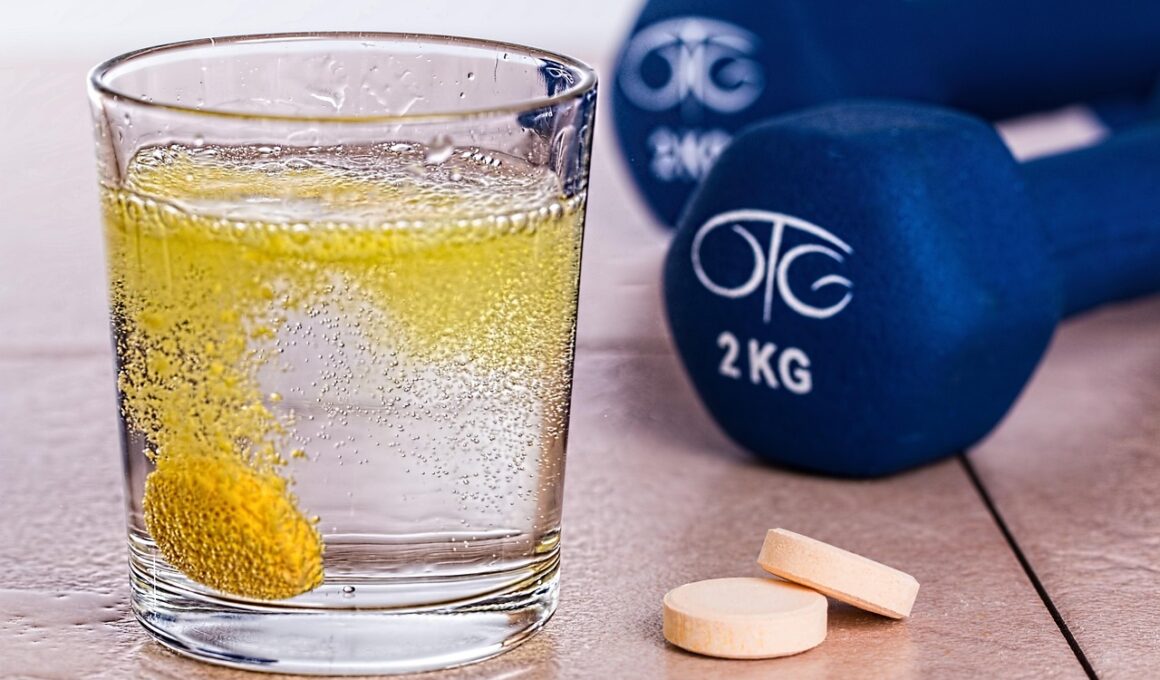Electrolyte Supplements to Prevent Fatigue in Endurance Sports
Fatigue is a frequent challenge faced by endurance athletes, potentially hindering performance and recovery. Electrolytes, including sodium, potassium, and magnesium, play crucial roles in maintaining hydration levels, muscle function, and overall bodily functions during physical activity. An adequate supply of these electrolytes is essential to prevent fatigue and enhance performance. During exercise, athletes lose these vital minerals through sweat, which can lead to imbalances that may cause cramps, weakness, and even confusion. Incorporating electrolyte supplements in the form of drinks or tablets can help replenish these lost minerals and maintain optimal hydration. In addition to enhancing performance, adequate electrolytes can also improve recovery times following intense training sessions. This can lead to more effective workout sessions and improved training adaptations over time. Furthermore, athletes focusing on endurance events must be proactive in their electrolyte intake to prevent depletion, particularly in hot and humid climates. It’s important to select high-quality supplements carefully designed for endurance athletes to maximize their effectiveness. Each supplement varies in formulation and can influence overall performance outcomes.
The Importance of Sodium in Endurance
Sodium is one of the most critical electrolytes needed during endurance sports and plays an essential role in regulating fluid balance within the body. As athletes perform and sweat, they lose sodium alongside water, leading to potential depletion. This depletion can significantly contribute to fatigue, decreased performance, and other heat-related illnesses. By ensuring a steady intake of sodium before and during prolonged exercise, athletes can better maintain their hydration levels, allowing their muscles to function more effectively. It helps transmit nerve impulses and aids muscle contractions, making it vital for any athlete involved in endurance sports. Sodium supplements are available in various forms, including tablets, powders, and drinks tailored for athletic performance. Choosing an electrolyte supplement that is high in sodium can help provide a quick source of this essential electrolyte during training sessions or long races. Regular consumption allows athletes to counteract sodium losses effectively and helps maintain optimal hydration, supporting endurance and overall performance. Additionally, finding the right balance between sodium and other electrolytes can provide athletes with added benefits and enhance recovery.
Potassium is another vital electrolyte necessary for athletes who engage in endurance sports. It plays a key role in muscle contraction and overall fluid balance within the body. Maintaining optimal potassium levels helps prevent muscle cramping and fatigue during exercise, which is crucial for athletes seeking enhanced performance. Just like sodium, potassium is lost through sweat during prolonged physical activity. Therefore, athletes must pay attention to their potassium intake before, during, and after their workouts. Consuming potassium-rich foods such as bananas, oranges, and spinach can help replenish lost levels. However, supplements can be a convenient option, especially during long endurance events when food consumption may be challenging. Proper electrolyte balance, including potassium, can improve cardiovascular health and assist with muscle recovery. In addition, potassium helps regulate heart rhythms, which is essential for athletes during rigorous training. Supplementing with potassium may also support better hydration levels and enhance endurance performance. Ultimately, the right combination of potassium intake through diet and supplements can make a considerable difference in fatigue reduction and overall athletic performance.
Magnesium: A Key Player in Performance
Magnesium is often overlooked but is a crucial electrolyte that profoundly impacts athletic performance and endurance. It is involved in over 300 biochemical reactions in the human body, including energy production, muscle contraction, and protein synthesis. An adequate magnesium level is vital to reduce fatigue and enhance endurance outcomes. During prolonged exercise, sweat can lead to a deficiency of magnesium, resulting in potential muscle cramps, fatigue, and reduced performance levels. Ensuring proper magnesium intake through diet or supplements can help prevent these issues and support an athlete’s overall performance and recovery. Foods rich in magnesium include nuts, seeds, whole grains, and leafy green vegetables. However, many athletes may benefit from magnesium supplementation, especially those in high-endurance sports. Supplements come in various forms, including powders and capsules, providing flexibility based on individual preferences. Prioritizing magnesium supplementation can enhance athletic endurance by improving oxygen uptake and energy production, helping athletes push through intense workouts with optimal performance. By focusing on magnesium alongside sodium and potassium, athletes can create a comprehensive electrolyte strategy.
Hydration strategies combined with electrolyte supplementation are crucial for preventing fatigue in endurance sports. Athletes should develop personalized hydration plans that consider their sweat rates, exercise intensity, and duration. This can significantly impact the electrolyte levels lost during exercise. Timing plays a vital role in a successful supplementation strategy; athletes should begin electrolyte intake before exercising, during, and after workouts to ensure they remain adequately fueled. Moreover, experimental trials may help athletes find the most effective electrolyte ratios that suit their specific needs. Supplementation can often be adjusted based on workout conditions such as temperature and humidity. By balancing their water and electrolyte intake, athletes can enhance performance, fight off fatigue, and improve overall endurance during events. Furthermore, athletes may need to learn to listen to their bodies, recognizing the signs of dehydration and fatigue. This knowledge can significantly aid them in determining when to consume electrolyte supplements. Ensuring good hydration and proper electrolyte balance is integral to maximizing performance in high-endurance sports.
Choosing the Right Electrolyte Supplement
When selecting an electrolyte supplement, it’s essential to consider various factors, such as the ingredient composition, flavor, and form (powder, tablet, or drink). Not all supplements are created equal, and choosing a product designed specifically for endurance athletes can significantly impact effectiveness. Reviewing ingredient labels helps identify the presence of key electrolytes like sodium, potassium, and magnesium. The right balance of these electrolytes is necessary for optimal performance and recovery in endurance sports. Additionally, some products may contain sugars, which can provide quick energy sources, but athletes should be cautious about excessive sugar content. Seeking an ideal combination of carbohydrates and electrolytes can help enhance endurance performance while preventing fatigue during prolonged activities. Taste is also a crucial consideration, as being able to enjoy the flavor can improve consistency in consumption. Finding a supplement that athletes can easily incorporate into their routine boosts compliance in adhering to hydration and electrolyte strategies. Ultimately, the right choice can have lasting benefits on performance and recovery, allowing endurance athletes to maximize their training potential.
Restoration strategies play an important role in managing fatigue and ensuring peak performance. After intense endurance activities, athletes must replenish lost fluids and electrolytes to recover effectively. A combination of hydration and nutrient-support strategies post-exercise can help optimize recovery and prepare the body for subsequent workouts. Electrolyte supplements can be integrated into recovery drinks, which provide both fluid replacement and essential nutrients to encourage recovery. Moreover, combining electrolyte intake with protein-rich foods can further enhance muscle recovery and reduce soreness. Foods and drinks that promote electrolyte restoration can turn out to be invaluable assets in an athlete’s post-training routine. For bloating issues, athletes should consider electrolyte types, as some formulas may contribute to digestive discomfort. Listening to one’s body and adjusting electrolyte consumption accordingly can provide several benefits in recovery and performance. Continuous adaptation and practice create a unified approach to handling fatigue, with a focus on hydration, nutrition, and supplements. By utilizing a combination of proper electrolyte intake and nutrition, athletes can successfully manage fatigue while achieving their performance goals.


